She knew the weight of those five minutes. “I’d made a specific script to speak for 15 minutes, along with another to speak for 10, a script for five, and one for three minutes. I thought: ‘What can I say that is remarkable, that provides a technical contribution as well as the words of the Indigenous peoples?’” Three years after the day she made her first oral argument before Brazil’s Federal Supreme Court, in the early stages of hearings on a proposed historic cut-off point for demarcation of Indigenous territories, Indigenous attorney Samara Pataxó, from her in her small office at the Supreme Electoral Court in Brasília, shared details with SUMAÚMA from that day on September 1, 2021, that defined her life and her career.
Pataxó, born in Coroa Vermelha Village, in the state of Bahia, has worked at the Supreme Electoral Court since 2022, in a position created by Supreme Court Justice Edson Fachin. The 34-year-old attorney, who holds a master’s and is now pursuing a doctorate in law, is the first Indigenous person to join a higher court in Brazil. The 2024 municipal elections are the second vote she is watching from her post, after making her debut in the tumultuous 2022 presidential contest. She has since stayed on as the chief inclusion and diversity adviser at the Supreme Electoral Court. Justices Alexandre de Moraes and Carmen Lúcia, who succeeded Fachin as chief justices on the electoral court, decided to keep her in the role.
The historic cut-off point legislation is a legal argument created by the ruralist lobby and predatory agribusiness whereby territory can only be demarcated if the Indigenous people claiming it were occupying the land on October 5, 1988, the day when Brazil’s Constitution was enacted. The Federal Supreme Court has already ruled it unconstitutional and has said it ignores the history of extermination and persecution perpetrated against Brazil’s original peoples. It has been Samara’s subject of study since she graduated with a bachelor’s in law from the Federal University of Bahia.
As an amicus curiae (a Latin expression meaning friend of the court, an attorney who provides support to the decision-making body during a trial), Samara was representing the United Movement of Indigenous Peoples and Organizations of Bahia that day in oral arguments before the Supreme Court. Justice Luiz Fux, the chief justice at the time, decided that each attorney would only have five minutes to speak. Because of the covid-19 pandemic, arguments were held virtually, over Zoom, and broadcast life on TV Justiça. Samara was locked in her Colina complex dorm room at University of Brasília. The grandeur of the moment was not lost through the screen. Her white headdress sat in contrast to her pitch-black hair, lying long and straight, a necklace of red seeds and the Pataxó feather earrings she was wearing that special day – and still frequently wears – stood out sharply against her white shirt. It was a strong image. She spoke eloquently.
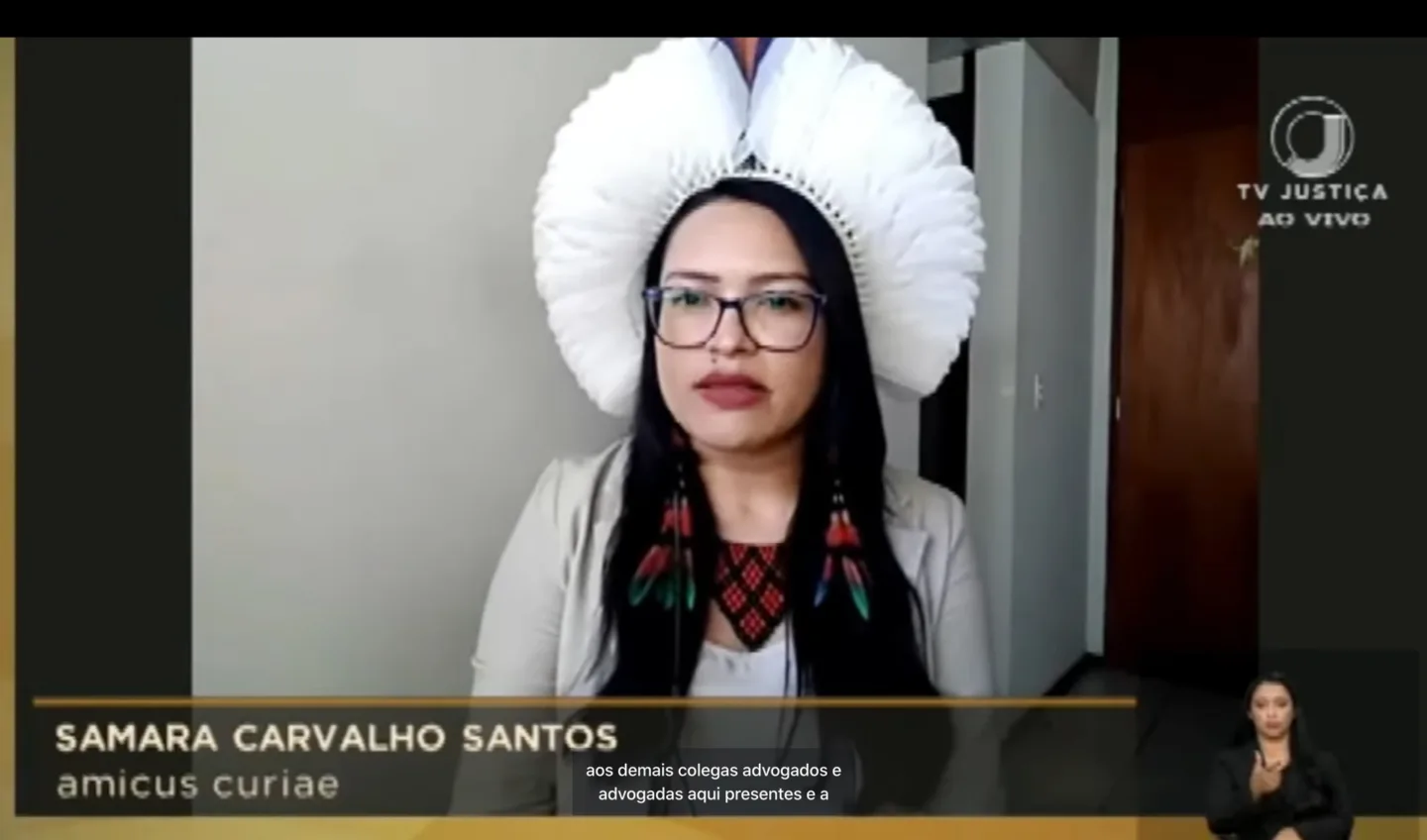
With her striking look and eloquent speech, Samara’s oral argument during the historic cut-off point hearings, in 2021, set the stage for her career. Photo: Screenshot
With the clock ticking down her 300 seconds, Samara made it clear to the Supreme Court justices that she was speaking not just as an attorney, but especially as an “Indigenous woman, who belongs to the Pataxó people, of the state of Bahia.” The ruling on the historic cut-off point, she continued, would define “the future of our lives,” the existence of the original peoples. It was there in Bahia, near Coroa Vermelha Beach, that the Portuguese landed in 1500. “We must never forget that the first invasions, plunderings and thefts of our territories and riches began here as well. We have fought for over five centuries to live with dignity.”
She was decisive: as if imposing a language, a faith, a type of civilization, a standard of society, of development and of progress on the Indigenous peoples were not enough, now, using the historic cut-off point legislation, they wanted “to limit, interfere with, and dictate the outlines of our usufuct, enjoyment and fulfillment of our territorial rights, even though these rights are established in the Constitutional Charter, including as an eternity clause.” The people supporting such an absurdity, she concluded, are the same monsters who expelled the Indigenous people, by force and under gunfire, from their ancestral territories.
The answer to the equation
Her five-minute script was persuasive. In his opinion ruling against the historic cut-off point thesis, the court’s rapporteur, Justice Fachin, cited the Pataxó attorney. “A Supreme Court justice mentioning me in his opinion? For me, that meant I had already made it in life, right?” Samara says, wrapping it in another of her many loud laughs during our talk. She seems to take joy in smiling.
Two months after making her oral argument, an adviser to Justice Fachin reached out to Samara. “She said that Justice Fachin was going to take over as the chief justice of the Supreme Electoral Court, serving a short term, but he was interested in paying attention to underrepresented groups in the electoral process.” Fachin was looking for help to think about Indigenous participation in politics, and he was awed by Samara’s speech at the Federal Supreme Court. Samara took part in a meeting with the technical team for the Electoral Supreme Court’s future chief justice. “I was happy, honored, I talked to the team, and I went back to my life. I worked as legal counsel at the Alliance of Indigenous Peoples of Brazil.”
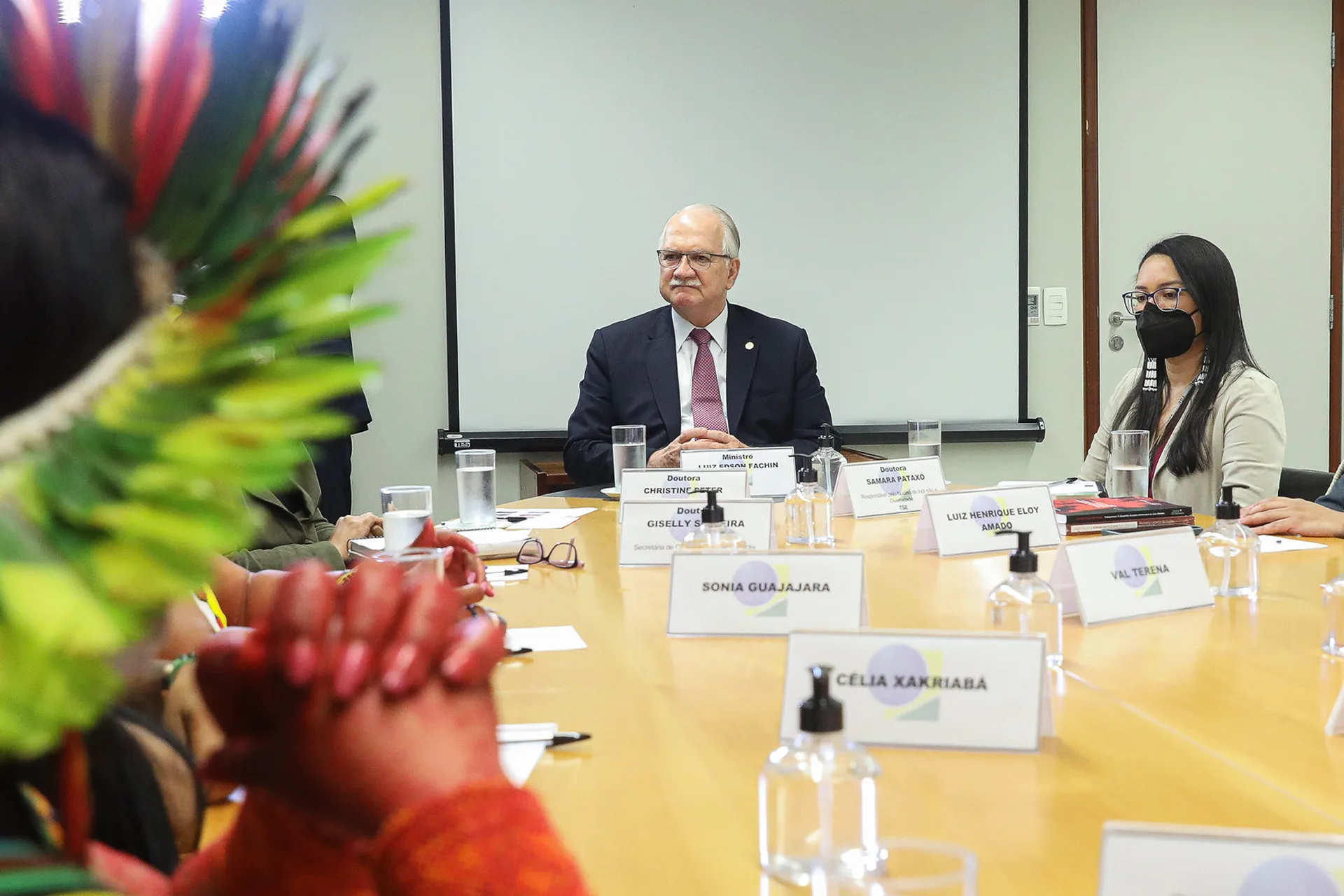
Justice Fachin, who asked Samara to take the position, is opposed to the historic cut-off point and was open to listening to Indigenous people during his term. Photo: Antonio Augusto/Secom/TSE
Except the questions wouldn’t stop there. The adviser again contacted Samara, days later, to schedule a time for her to talk to Justice Fachin. At the meeting, Fachin told her about his plans to create a center for inclusion and diversity at the Supreme Electoral Court, and he was direct. He asked the attorney if she would agree to implement and coordinate it. “Good thing it was during the pandemic and we were wearing masks… because I was just like this, whoa, mouth agape.”
She asked the justice for time to think, because this challenge transcended the Indigenous issue. That year, in 2021, at the height of right-wing extremist Jair Bolsonaro’s administration, Samara was leading a series of legal initiatives at the Alliance of Indigenous Peoples of Brazil to try to contain the destruction and drastic removal of Indigenous rights. Yet she realized that moving to the Supreme Electoral Court would be a crucial step in representation. “It isn’t every day that one of us receives an invitation, directly from a Supreme Court and Supreme Electoral Court justice, to occupy a space where none of us has ever been before.”
Justice Fachin believes he hit the bullseye. “More than a brilliant attorney, Samara Pataxó is a voice representing a significant part of Brazilian society that has historically been invisible. The inclusion of professionals like Samara in the court system is of crucial importance to strengthen democracy and ensure the Judiciary truly reflects the diversity of the Brazilian people,” the judge said in a written message sent to SUMAÚMA. According to Fachin, the Indigenous lawyer contributed “essential and, above all, human perspectives on the development of projects and actions under the auspices of the electoral courts.”
Fachin, an important voice against the historic cut-off point, emphasized that Samara’s presence at the hearing “was symbolic, drawing everyone’s attention with the solidity and clarity of her oral argument.” Her trajectory, he concluded, “inspires and strengthens a commitment to inclusion and diversity, needed in every sphere of the government.”
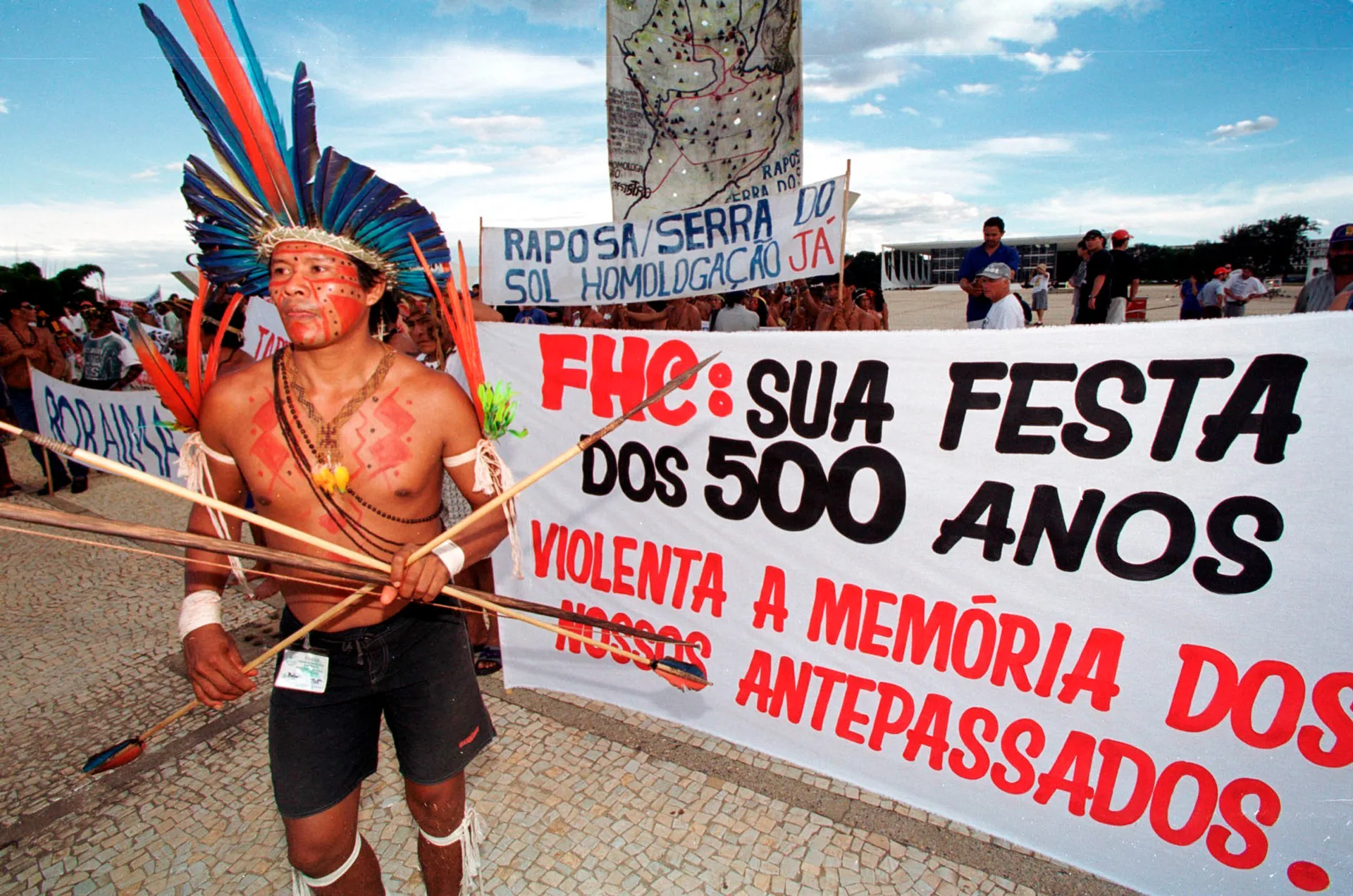
While the Fernando Henrique Cardoso administration celebrated ‘500 Years of Discovery,’ Indigenous peoples remembered how their ancestors have been massacred since the 1500s. Photo: Carlos Eduardo/Folhapress
Voter and candidate: who are they and where are they?
Samara’s job at the Supreme Electoral Court is to create strategies and actions for underrepresented groups to grow their political participation, as voters or as candidates. She says that inclusion is now a high-priority issue incorporated into the organizational culture of the Supreme Electoral Court and of the country’s 27 Regional Electoral Courts.
“It doesn’t happen overnight,” she stresses, but important results have already been achieved. “For example: better voter identification was pending implementation in the electoral courts – whether they identify as cisgender, transgender, Indigenous, Quilombola… What Indigenous language does that person speak? A rule approved in 2021, here at the Supreme Electoral Court, mandated this data, but it had yet to be implemented,” she says.
How many Indigenous voters are there in Brazil? What ethnicities are they? Where do they live? “Today we can have this information filtered by the electoral court’s voter registration, with open data, in the Brazilian voter’s profile.” This detailed registration was implemented with the support of Samara’s office, starting in November 2022. The electoral courts have been collecting candidate data since 2014, but this comprehensive look at voters only began two years ago. Of the nearly 156 million qualified voters in Brazil, 155,661 (around 0.1%) self-declare as Indigenous, belonging to more than 300 ethnicities. This includes 11,576 people who say they do not know which peoples they descend from and another 2,538 who said they are of “undetermined” ethnicity.
Knowing the profile of groups of voters that have been invisible, Samara explains, is a tool to “put public policies on the agenda that improve and grow the Indigenous population as voters.” Itinerant voter education activities in hard-to-access areas are also monitored by Samara and her team. “It’s explaining, in these communities, the importance of voting.” Of course along with all of this, keeping election day logistics in mind is always a must, guaranteeing the right to vote, even in the most remote communities.
Affirmative action alone can foster growth in candidates from underrepresented groups, such as Indigenous peoples, Black people, and women. Her office is not responsible for enforcing whether political parties are allocating 30% of their resources to Black and women candidates, as required by law. The office is, however, responsible for letting people know about channels for getting reports to the Federal Public Election Prosecutor’s Office. The fact that Congress passed a constitutional amendment in late August to grant amnesty – to the tune of R$ 23 billion – to political parties that failed to follow rules on providing funding to women and Black candidates “is a symptom of something that needs to be worked on,” she says, without opining on the substance of the proposal. Her position on the Supreme Electoral Court prevents her from sharing an opinion.
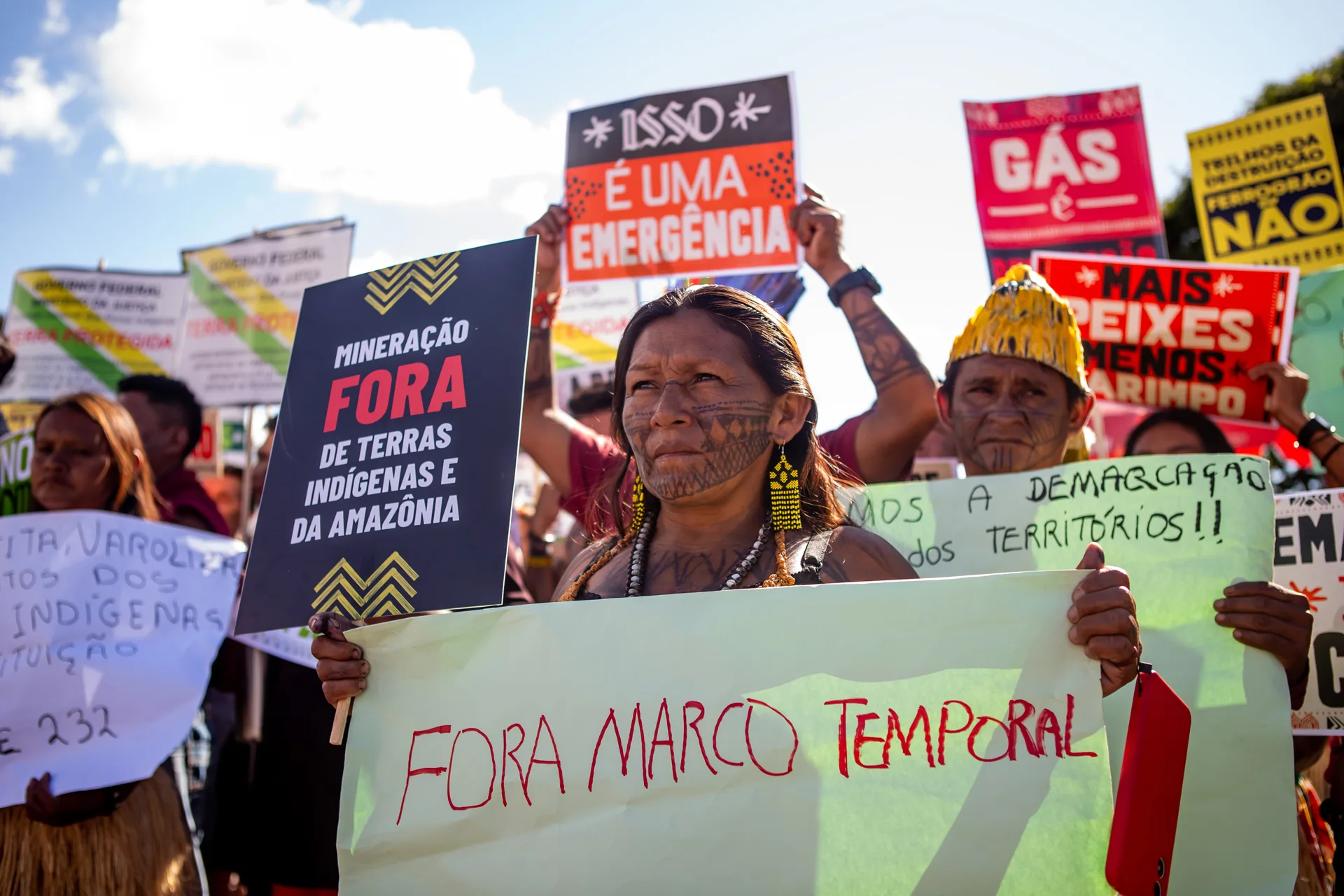
The use of a historic cut-off point to determine land demarcations mobilized Indigenous people across Brazil and Samara had taken an interest even before she became a scholar. Photo: Lela Beltrão/SUMAÚMA
A 30% quota for Indigenous people
The 30% quota for candidates to be women and Black will also apply to Indigenous candidates, but only in the next election. Early this year, the Supreme Electoral Court ruled in favor of Célia Xakriabá, a federal deputy representing Minas Gerais for the Socialism and Liberty Party, after she asked for Indigenous candidates to receive the same share of resources to fund their runs for office as well as proportional time for election ads on radio and TV.
In the 2020 elections, 2,216 candidates who self-declared as Indigenous ran for office, which is 29% more than in the municipal elections in 2016, when 1,715 Indigenous candidates were up for election. Now in October, 2,578 of candidates running for mayor or city council have self-declared as Indigenous. “Indigenous people are interested in party politics, but they lack conditions, access, information, the possibility of serving a term. But despite still being in a tough situation, of inequality, they are speaking up and their interest in electoral contests has been growing.”
Born and raised in the far south of Bahia, Samara is proud to say that she and her younger sisters managed to graduate from university. The family has two lawyers and one physiotherapist. The road there was not easy, however. “Back in the 1990s, the kids in my generation already had access to school in the village, still in precarious situations, but it was the place we had to learn to read as well as to be able to read and write.”
For high school, Samara had to transfer to a non-Indigenous state school outside of the village. As a girl, she had dreamed of studying education, but everything changed after an administrative services internship spent working as a young apprentice at Brazil’s Indigenous affairs agency, Funai, in Porto Seguro. “Reality hit me there in a way that motivated me to have another career.”
She, a Pataxó, saw in civil service an everyday insensitivity and grudging action in fulfilling Indigenous rights. And she noticed that most of the civil servants were not Indigenous. “I realized that if I understood the laws, I could help my people, especially in relation to the demand for territorial rights. Someone was needed who understood the laws so this could be turned to our favor.”
A source of inspiration
While the desire to study law was still developing, she was influenced by Joenia Wapichana, now the Funai’s first female president and the first Indigenous woman to practice law in Brazil. Joenia had gained national media attention after making an oral argument in the case of the Raposa Serra do Sol Indigenous Territory, in 2008, when the original peoples were demanding their whole territory.
“Looking at Joenia made me sure I wanted to study law. This awakened me, she became my reference. When I saw that Indigenous attorney at the Supreme Court advocating for the peoples’ rights, I said: ‘That’s what I want’.”
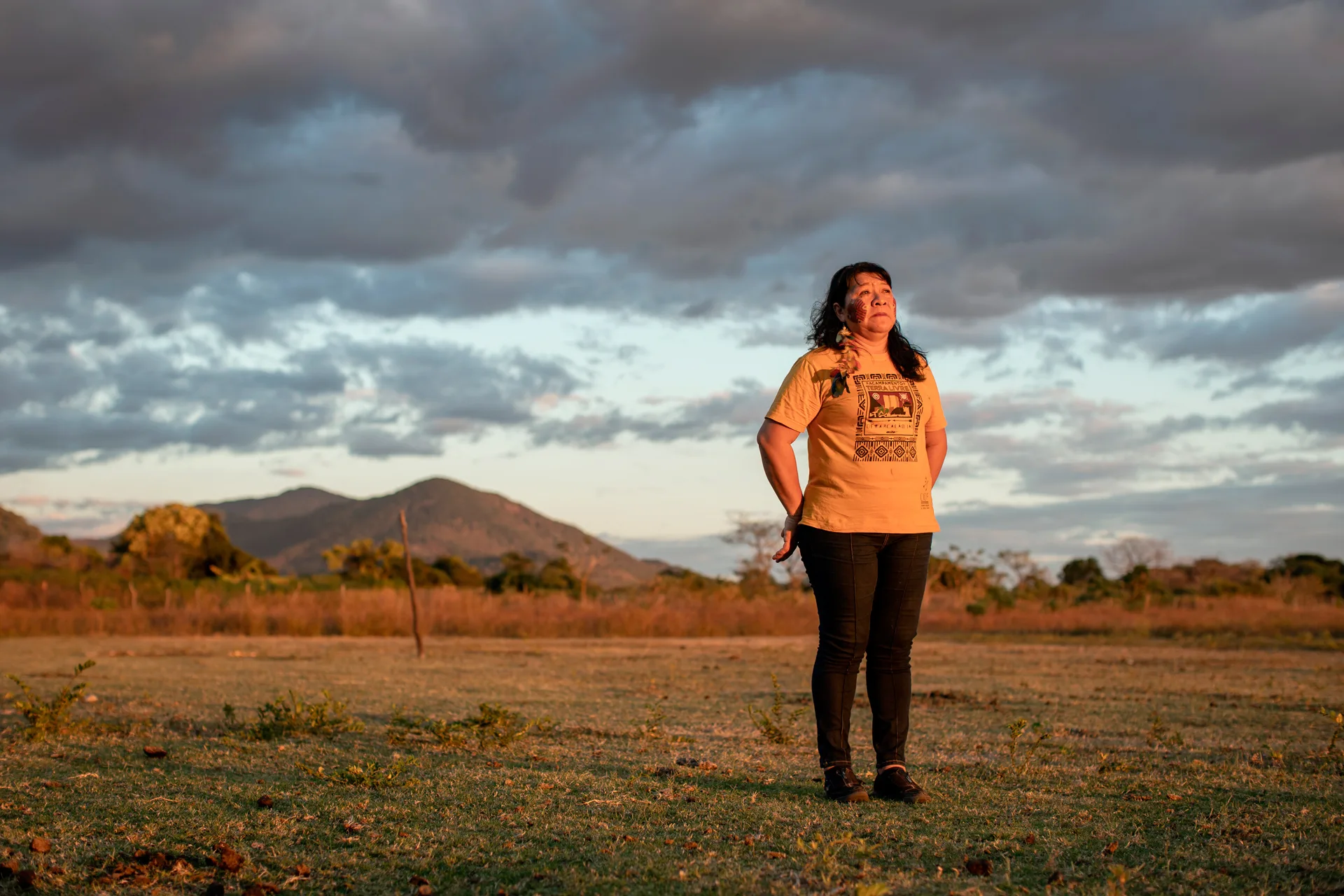
Joenia Wapichana, the head of Brazil’s Indigenous affairs agency, an attorney, and the first Indigenous woman to argue before the Supreme Court (in the Raposa Serra do Sol case), is an inspiration to Samara. Photo: Avener Prado/Folhapress
She spent two years trying to get into university. “I didn’t make it the first time.” Her family told her not to give up and she tried again the next year. Samara spent the year working as a hotel receptionist in Coroa Vermelha. Her second try was a success.
The academic experiences she yearned for mixed with hostility. “Law is, traditionally, an elite course, and it’s no different in Salvador. People like me, an Indigenous woman from Bahia’s hinterlands, from a lower socio-economic background, they face a prejudiced, exclusionary environment.” Her classmates came by car from Salvador’s upscale Graça neighborhood. She always took the bus. “My stop was several kilometers away, I would take some shortcuts, climb the hill and cross through an alley.” Samara’s grades were always worse than the rest of the class. “I would compare myself to my classmates, except they had access to the best schools, the best courses, and look at my reality… There’s no way to compare me to these people.”
In Salvador, she lived with the family of a church pastor who would visit the village. She was going to stay for six months, but they ended up hosting her in the city for three years.
It was impossible to reconcile work with her law program. “At the time there was a R$ 400 Funai scholarship, but it wouldn’t get sent every month.” During Lula’s second term (2007-2010), the Education Ministry made changes to the Tutorial Education Program, paying special attention to Indigenous people, Quilombolas, and students from traditional communities. Samara and colleagues from other university programs created an interdisciplinary study group to join the program. “It helped us with the academic part, developing our research and work, as well as socio-economically.”
In late 2014, she had her first experience interning at a private law firm. She only left the job when she had to prepare to take her bar exam and work on her thesis paper. Federal Permanence Scholarship aid for Indigenous and Quilombola students in vulnerable situations helped her make ends meet. “I was living on R$ 900 a month.”
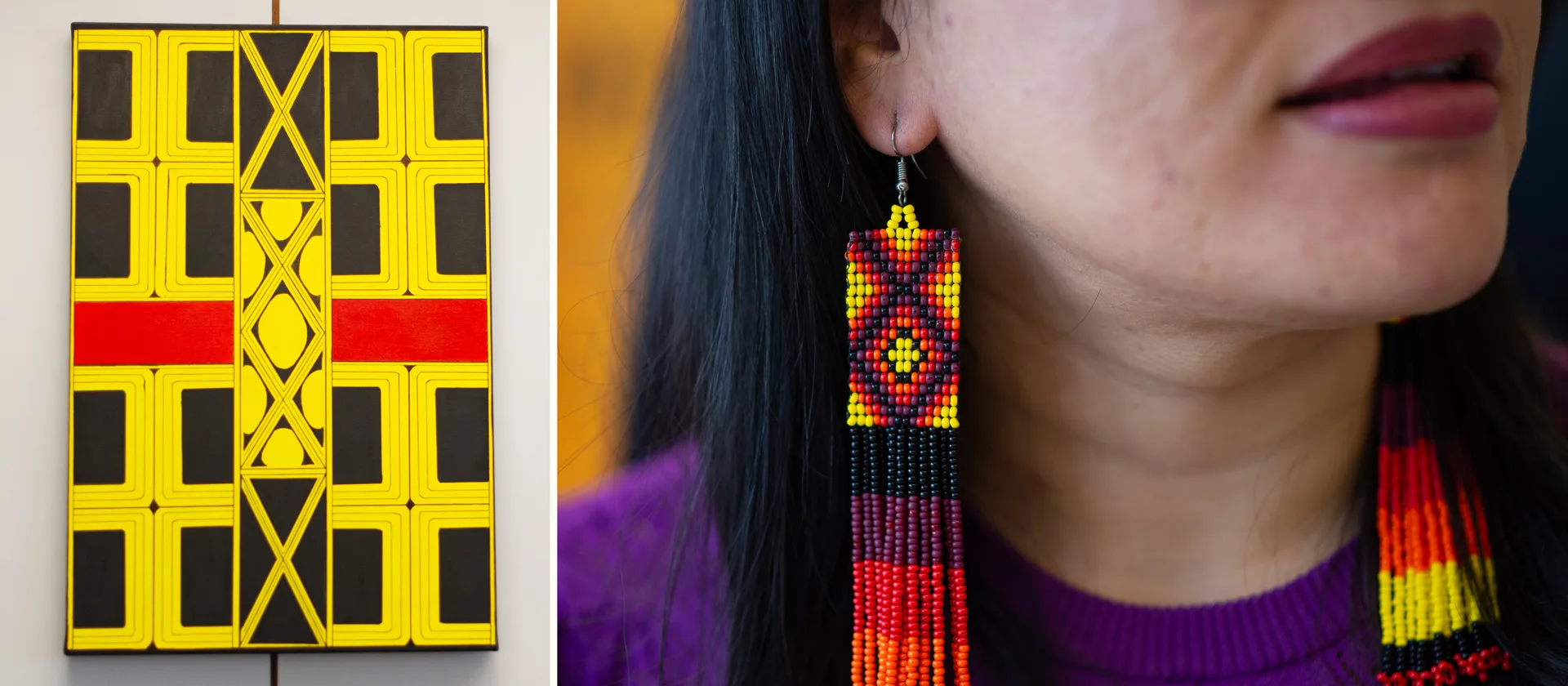
The Supreme Electoral Court’s chief adviser on inclusion always says she is Pataxó first and a lawyer second, as evidenced by her accessories and the items in her office. Photos: Andressa Anholete/SUMAÚMA
She failed to pass the bar exam on her first try. The second time around, she spent her savings on a prep course and did plenty of solo studying. It worked. But she still had to finish her thesis paper to graduate. And find an adviser. One of the few professors discussing the subject of Indigenous rights at the school, prosecutor André Batista Neves, happily agreed to the task. “When Samara asked me to be her adviser, she already came with the issue of the historic cut-off point, which wasn’t as high-profile at the time. As an Indigenous person, she knew how important the topic was and what it would become,” the prosecutor told SUMAÚMA.
André Neves tried to convince Samara to write her thesis on a different topic, since there was little literature on the historic cut-off point. “Samara was firm. She knew exactly what she wanted to research, and she was more right than I was. The historic cut-off point turned out to be the most problematic subject. It is a thesis that is completely dissociated from the law, that has gained huge defenders. Good thing the Supreme Court overruled it. It was indeed a more pressing subject,” he said.
Her final thesis paper – on how the historic cut-off point affects demarcations – oriented Samara’s research for her master’s degree and it guides her now as she pursues her doctorate. She has continued to study the subject in her master’s and doctoral studies. Although the Federal Supreme Court ruled the historic cut-off point unconstitutional by 9 votes to 2, the ruralist lobby’s strength has pitted the legislative branch against the judiciary’s decision. Not only did Congress pass a bill (Law 14.701/2023) days after the Supreme Court’s ruling, but congressional members also want to amend the constitution. There is a proposed constitutional amendment that is ready to go to a vote in the Senate, which should happen after the second round of voting in the general election.
Driving force
The historic cut-off point has run through Samara’s personal, academic, and professional life. After finishing her bachelor’s, she was hired by the private law firm where she had interned. “I didn’t spend a single day unemployed.” But because she felt a need to help her relatives, she began to provide free legal aid to Indigenous movements and NGOs. “They didn’t have any way to pay.”
Wanting to continue studying and researching, Samara completed a specialization in the State and Law for Traditional Peoples and Communities at the Federal University of Bahia, finished in 2018. A friend, also an attorney, encouraged her to apply to the master’s program at the University of Brasília through the affirmative action system. “I submitted a project, underwent selection, and was accepted,” she recalls with a big smile.
At the nation’s capital, she moved into a university apartment available to Indigenous students from other states. She received a R$ 1,500 scholarship from Capes, an institute supporting higher education in Brazil. “I imagined Brasília was a great place to make contacts.” She was right. Eloy Terena, now the executive secretary at the Ministry of Indigenous Peoples, was assembling the legal coordination team for the Alliance of Indigenous Peoples of Brazil and the national Indigenous attorney network. Samara was part of this construction. She jumped from her master’s to her doctorate – “because I didn’t want to leave Brasília” (big laughs). In 2020, Eloy Terena invited her to work at the Alliance of Indigenous Peoples of Brazil.
“Our first action in getting started was the ADPF 709 – an action against the violation of a fundamental constitutional right – filed with the Federal Supreme Court. It regards adoption of measures by the federal government to contain and protect Indigenous people against covid-19.” Samara explains that this action was a milestone in the Indigenous movement because “it opened a door of legitimacy for the Alliance of Indigenous Peoples of Brazil.” The Supreme Court ruled that the Indigenous organization, with no taxpayer ID number, is empowered and has the autonomy to decide on actions directly, without intermediaries. It was unprecedented in the courts.
The road Samara has traveled is a quilt patched together with care and planning, where each piece aligns. “Because Joenia inspired me, other generations now remember me too at the Supreme Court, as a woman advocating for Indigenous rights.”
“Bring the village to politics” is the expression that emerged in the Indigenous movement to encourage candidates to run, paving the way for women like Joenia, Sonia Guajajara, and Célia Xakriabá. Bringing the village to politics, Samara explains, is a call “for the Indigenous people to vote Indigenous, for non-Indigenous people to also vote Indigenous, and for these people, when elected, to continue to bring the village to these spaces, in the Chamber [of Deputies], in the Senate, in city halls.” For Samara, “being in these decision-making spaces is what will make it possible for us to build something we want, that fulfills our rights, that fulfills public policies.”
On the ground that bears her footprints, Samara Pataxó also understood the importance of bringing the village to the courts.
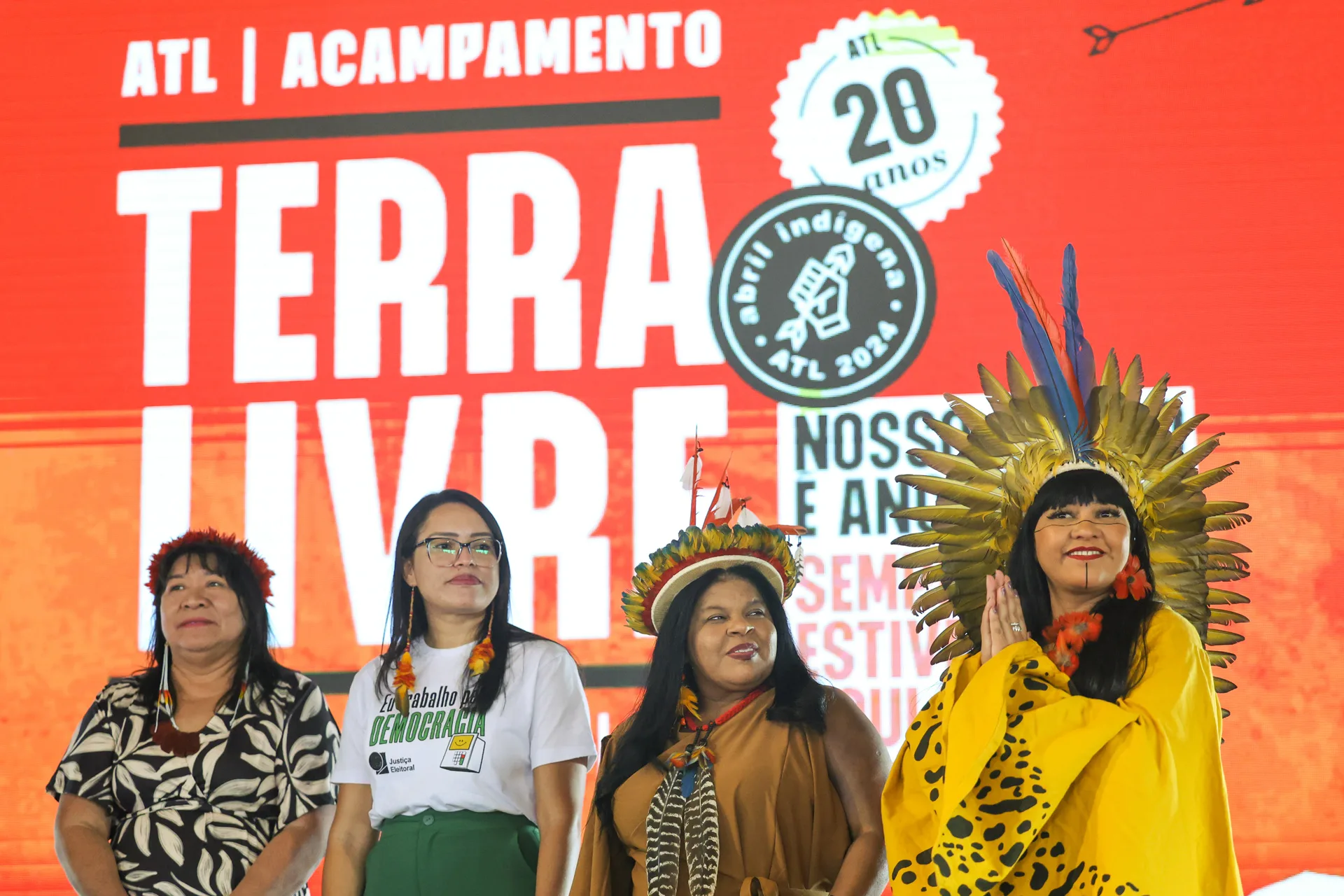
Building villages means opening spaces, says Samara, who, alongside Joenia, Sonia Guajajara and Célia Xakriabá, is blazing trails for the Indigenous peoples. Photo: Fabio Rodrigues-Pozzebom/Agência Brasil
Report and text: Malu Delgado
Editing: Talita Bedinelli
Photo Editor: Lela Beltrão
Fact-checker: Gustavo Queiroz and Plínio Lopes
Proofreader (Portuguese): Valquíria Della Pozza
English translation: Sarah J. Johnson
Spanish translation: Julieta Sueldo Boedo
Editorial workflow coordination: Viviane Zandonadi
Editor-in-chief: Talita Bedinelli
Editorial director: Eliane Brum





